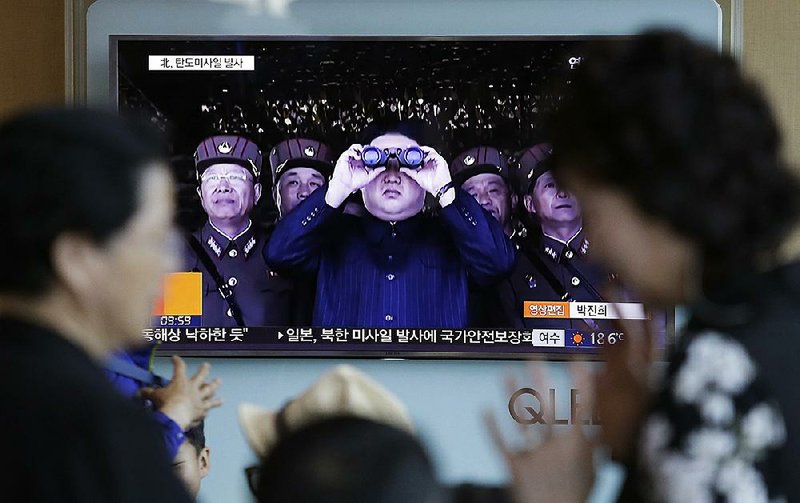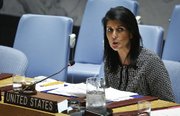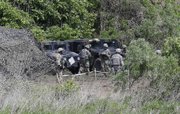TOKYO -- If Kim Jong Un wants to meet President Donald Trump, he's going about it the wrong way, Nikki Haley, the U.S. ambassador to the United Nations, said Sunday after North Korea's latest missile launch.
North Korea said today the missile was a new type of "medium long-range" ballistic rocket that can carry a heavy nuclear warhead. Kim promised more nuclear and missile tests and warned that North Korean weapons could strike the U.S. mainland and Pacific holdings.
Today's claim, if confirmed, would mark another big advance toward the North's goal of fielding a nuclear-tipped missile capable of reaching the U.S. mainland. Some experts, including officials in Tokyo, estimate that Sunday's launch successfully tested a new type of missile in Pyongyang's arsenal.
Trump administration officials hope the latest launch will encourage China to use its leverage over North Korea to stop the missile and nuclear tests, as Trump has been urging President Xi Jianping to do.
"The United States maintains our ironclad commitment to stand with our allies in the face of the serious threat posed by North Korea," a White House statement said.
The statement called for stronger sanctions against the North but did not directly threaten U.S. military action. Trump has said previously that bellicose actions by Kim's government could trigger "major, major conflict."
In its statement, the White House appeared to call indirectly for Russian support in containing Kim's nuclear ambitions, suggesting they also posed a threat to Russia.
"With the missile impacting so close to Russian soil -- in fact, closer to Russia than to Japan -- the president cannot imagine that Russia is pleased," the statement said.
Russia, a former ally of North Korea, is a member of a six-nation consortium aimed at reining in the reclusive nation's nuclear program through diplomatic and financial incentives, but that forum has been inactive for nearly a decade.
The U.N. Security Council said Sunday that it will hold urgent consultations on North Korea's latest ballistic missile test at the request of the United States, Japan and South Korea. Uruguay holds the council presidency this month and its U.N. Mission announced the closed consultations will be held on Tuesday afternoon.
The Security Council has adopted six increasingly tougher sanctions resolutions against North Korea
The launch also jeopardizes new South Korean President Moon Jae-in's willingness for dialogue with the North, and came as U.S., Japanese and European navies gather for joint war games in the Pacific.
"The president expressed deep regret over the fact that this reckless provocation ... occurred just days after a new government was launched in South Korea," senior presidential secretary Yoon Young-chan said. "The president said we are leaving open the possibility of dialogue with North Korea, but we should sternly deal with a provocation to prevent North Korea from miscalculating."
Moon, South Korea's first liberal leader in nearly a decade, said as he took his oath of office last week that he'd be willing to visit the North if the circumstances were right.
At the same time as talking tough, Trump has also called Kim a "smart cookie" and said he would be "honored" to meet the North Korean leader. A North Korean diplomat in charge of U.S. affairs said over the weekend that Pyongyang would hold talks with Washington "under the right conditions."
But Haley, speaking Sunday after the latest missile launch, said talks could not take place while such provocations continued.
"Having a missile test is not the way to sit down with the president because he's absolutely not going to do it," Haley told ABC News' This Week. "Until he meets our conditions, we're not sitting down with him."
Over the past couple of years, North Korea has said it would hold talks with the United States as long as denuclearization was not on the agenda, a deal-breaker for the U.S. Meanwhile, Washington has said it will not hold talks without some kind of nuclear freeze or suspension from North Korea.
That has led to a stalemate where former President Barack Obama's administration and now the Trump administration have refused to talk, and the regime in Pyongyang has pressed ahead with its weapons programs.
North Korea's official Korean Central News Agency called the missile, launched early Sunday from a site near its border with China, a "new ground-to-ground medium long-range strategic ballistic rocket," and said the "Hwasong-12" was "capable of carrying a large, heavy nuclear warhead." Kim was said to have witnessed the test and "hugged officials in the field of rocket research, saying that they worked hard to achieve a great thing," according to the news agency.
The rocket, "newly designed in a Korean-style," flew 490 miles and reached a maximum altitude of 1,310 miles, the North said, and "verified the homing feature of the warhead under the worst re-entry situation and accurate performance of detonation system."
The U.S. military said that the flight was "not consistent" with an intercontinental ballistic missile, but it did not identify what type of missile it was.
Kim said the North would stage more nuclear and missile tests in order to perfect nuclear bombs needed to deal with U.S. "nuclear blackmail."
State media paraphrased Kim as saying that "the most perfect weapon systems in the world will never become the eternal exclusive property of the U.S. ... strongly warning the U.S. should not ... disregard or misjudge the reality that its mainland and Pacific operation region are in [North Korea's] sighting range for strike."
John Schilling, an aerospace engineer who specializes in rockets, said that the missile launched Sunday was "almost certainly the 'mini KN-08.'"
Schilling said Sunday's missile could be a "test bed" for an intercontinental ballistic missile, being smaller than the KN-08 but using the same engines.
"If so, the ICBM program is more advanced than we had thought," Schilling said. "It will still need more testing, including a full-scale version, so it's still more than a year out -- but maybe not the five years we had hoped for."
David Wright, co-director of the global security program at the Union of Concerned Scientists, pointed out that other countries have taken decades to achieve Kim's aim of developing longer-range missiles. "What we see in the meantime is they are getting longer ranges than before and they are trying to scale up to intercontinental range," he said.
Information for this article was contributed by Anna Fifield of The Washington Post; Foster Klug, Hyung-Jin Kim, Mari Yamaguchi and Frances D'Emilio of The Associated Press; and Laura King of Tribune News Service.
A Section on 05/15/2017


